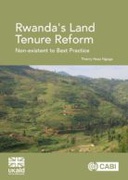Explore

s book is a detailed real account of all the key phases of the land tenure reform (LTR) programme in Rwanda and the critical factors that defined the outcomes and requirements for sustaining the process. In addition, the book provides an account of the impact of the programme, its challenges and lessons learned. Beyond LTR, this book also provides insights into emerging issues post-land tenure reform and what efforts are being undertaken to ensure sustainable land administration and land governance. The book draws on various types of secondary data, including relevant laws, policies, operational manuals and published studies, as well as consultants' reports. It also uses primary data comprising mainly interviews with policy makers, land professionals, academics, Civil Society Organisations (CSOs), donor organizations and the general public. This book is in four parts, with nine chapters. Part 1 provides the relevant context of the book and contains two chapters (chapters 1 and 2). Chapter 1 is the introduction and explains why land is so important; it discusses some of the issues land resources currently face, especially, in developing countries and why it should be managed and governed properly; it outlines why there is an urgent need for an improved land governance and land administration system or land tenure reform where this is not taking place, and it provides a summary of the importance of documenting Rwanda's LTR programme and explains why this book is timely and different from existing literature on land tenure reform. In chapter 2, the historical context of land tenure systems in Africa is summarized. Part 2 deals with the preparatory work that was carried out for land tenure reform and has one chapter (chapter 3). The chapter describes the key exercises that were undertaken as part of preparing the ground for the land tenure reform programme. Part 3 concentrates on implementation of the LTR programme and contains four chapters (chapters 4 to 7). Chapter 4 focuses on how the policy and regulatory frameworks were established which supported the LTR programme. Chapter 5 details the institutional framework that was developed to guide the LTR programme implementation, defining each institution's mandate and how they interacted with each other as well as how the capacity of these institutions was built to apportion responsibilities accordingly. Chapter 6 explains the whole process of rolling out the land tenure regularization process countrywide and the key steps that were involved, as well as the implementation process. In chapter 7, the key ingredients required to ensure that what has been achieved by the LTR would be properly maintained are assessed. The last part of the book (Part 4) assesses the impact of the LTR programme by discussing the socioeconomic benefits in chapter 8 where testimonies from various stakeholders and LTR beneficiaries are also presented. Chapter 9 concludes the book and a set of key success factors and lessons are also outlined for other countries wishing to follow a similar route as Rwanda in terms of land tenure reform.
This book is included in DOAB.
Why read this book? Have your say.
You must be logged in to comment.
Rights Information
Are you the author or publisher of this work? If so, you can claim it as yours by registering as an Unglue.it rights holder.Downloads
This work has been downloaded 216 times via unglue.it ebook links.
- 216 - pdf (CC BY-NC-ND) at cabi.org.
Keywords
- ACP Countries
- Administration
- Africa
- Africa South of Sahara
- agricultural tenure
- Developing countries
- development programmes
- development programs
- East Africa
- economic impact
- Francophone Africa
- Land management
- Land reform
- land resources
- Land tenure
- Least Developed Countries
- package programmes
- package programs
- Rwanda
- Social impact
- socioeconomic aspects
- Socioeconomics
- stakeholders
- subsaharan Africa
- sustainability
- Tenure
- tenure systems
- Third World
- underdeveloped Countries
Editions


